#genuinely one of the most batshit narrative structures i can think of
Explore tagged Tumblr posts
Text
just finished the original devilman manga. wuh!!
#genuinely one of the most batshit narrative structures i can think of#major major spoilers ahead im serious#monster of the week for like 2.9 volumes and then HARD pivot to literal actual armageddon#tbf my exposure is limited to a couple of crybaby watchthrough and the funny ova. yk the one#but only the first one 💀 idk why i didnt watch the second#the characterization differences between this and crybaby are really stark and thats been one of the things absently poking my brain#like really really stark#anyway what a time. im sure its depiction of humanity's self destruction is no longer relevant :)#and the ending always gets me but that final panel is SO FUCKING GOOD#raagghhhh#RAAAAAAAAA#i love the monster designs tbh. he got gnarly witg it in a really distinctive way#admittedly my experience w 70s (and prior) manga is super limited but at the very least the art feels unique to ME#and while my impression of the devilman manga was largely informed by yhat one post about everybody's expressions being wildly off#from their emotions but that's literally just a problem with ryo which means that shit's a character choice. which i love#how could i hate him just look. swagless#the scanlation i was reading did Not do the satan in love with akira reveal justice btw#it's like you ruined everything by fallin in love w akira and satan's like cam you blame me? im a hemaphrodite GIRL YOU CAN'T SAY THAT AND#ALSO WHAT???? WHAT???????#intersex people are famously prone to falling in love with akira fudo alias devilman. i guess??#i keep trying to figure out the logic but it's all bad. oh also ryo's logic in the beginning is kind of circular and dumb#it happened a couple more times but the guy was just raving. just saying shit. that he kind of made real ehich is extremely funny btw#omg manifesting!!!#ALSO I DID NOT KNOW THERE WAS SO MUCH DEVILMAN CONTENT????#i looked at the wiki trying to figure out the series order and like#in 1972 go started devilman and also in 1972 there was an anime adaptation and TWO SEPARATE MANGA ADAPTATIONS of the anime#the people were fucking insatiably lusting after devilman#dvilman lady and violence jack are extremely funny names to me btw#like 16 entries in looking at violence jack: evil town was just too much to me jfhsjsksh. violence georg#ANYWAY. good shit. poor akira as always. poor satan. they reinvented doomed yaoi or whatevr. poor boyos. etc
3 notes
·
View notes
Text
I have finished Mysterious Lotus Casebook, and here are some of my thoughts! (Obviously not spoiler free)
The cases are absolutely batshit insane and I loved it every single time they were like 'we totally collected this evidence that incriminates a secret suspect, just believe us and also don't question when the fuck we had the time to do this or when we figured out that we needed to look for it'. 10/10 no notes, that's a hilarious way to have a genius detective. Show us nothing, tell us everything, YES king.
That being said, I could have done with a lot less standing around having the supporting cast repeat whatever Li Lianhua and Fang Duobing announce, maybe in an attempt to make sure their genius is clear for the audience? I get it, but at the same time it felt a little too hand-holdy for me, especially in scenes where LLH and FDB had already discussed their findings between themselves before presenting them to the concerned bystanders. I can read between the lines (or else understand what has just been explicitly stated) without having every conclusion filtered through a slightly different sentence structure to make sure I got it.
Di Feisheng amnesia arc my fuckin beloved
Di Feisheng destroying his 'father' and freeing everyone in Di manor in a vicious act of catharsis that tied nicely into the main Nanyin bug-mind-control-thing narrative my beloved
Di Feisheng my beloved
The amount of times I was like...genuinely surprised he and Li Lianhua didn't kiss is both embarrassing (because I do in fact understand censorship and what I sign up for with these dramas and yet and yet) and numerous enough that I could...possibly...theoretically..write a 5+1 fic of every time I want them to kiss about it. No one hold me to that but it's something I think I'd like to do.
Re: the above point: because what the FUCK was that ending?!!! EXCUSE ME?! I gotta FIX THAT SHIT.
There will come a day when the strength of my hope for an unambiguously happy ending in a queer(-coded? is the source originally bl or is this its own thing?) wuxia drama is rewarded....but it is not this day. I must fix this myself.
Jiao Liqiao's laugh is one of the most annoying things I've ever heard. I was reaaaaally hoping someone would just up and stab her during one of her little evil laughing fits. At one point I was shouting "KILL HER, KILL HER" at my screen because I could NOT take anymore of her (unfortunately, I did in fact have to take more of her).
I still think her insistence on being obsessed with DFS is hysterical when he is so VISIBLY only interested in LLH. Explicitly STATES that his only life purpose is to fuck fight LLH again. Babygirl (derogatory) he is so fucking gay let's get you a nice knife to the gut instead, okay?
I thought the whole Shan Gudao plot was interesting, going from looking desperately for his body -> putting him to rest -> hunting for his murderer -> finding out he's alive/the mastermind behind everything going wrong (which I was proud of myself for realizing before the reveal, I'm normally bad at that) -> thwarting him with sass and superior martial arts at every possible turn -> killing him stone fuckin dead with beginner level skills because he's so up his own hole he can't see that's what's happening - was really fun!
He also has a SUPER annoying laugh he can fuck off
OH OH OH MARTIAL ARTS SKILL OF TRANS YOUR GENDER?! I MARRIED HER SO HER AFFAIRS ARE MY BUSINESS NOT YOURS??? ASKING YOUR WIFE FOR HER FORGIVENESS AND UNDERSTANDING AS YOU LAY DYING AND SHE GIVES IT TO YOU?????? OKAYYYYYYY
The twist at the end that LLH is the one with royal blood was so funny to me. Like it's a good twist and I love that Shan Gudao was just quite literally always a fuckin try-hard loser in ways he didn't even know, but also it was SO funny. Granny coming in clutch at the last fuckin minute with secret knowledge she just literally never shared.
LLH is such a smooth motherfucker. Shame about his insistence on dying when quite literally everyone (bar the people who suck) is begging this man to just live. Just LIVE DAMN IT!!!!! I really liked it when FDB begs him to just consider his own life as important for ONCE and remember that people care about him because YES his self-sacrificing and committment to Chilling Out Farmer Style was not the mercy he thought it was!
LIVE AND GROW OLD WITH DI FEISHENG YOU DAMN IDIOT (the likelihood of me resisting the urge to write at least the one fic for them is zero to none)
Unironically love spitting up blood as a plot device and this show is no different. The Drama. The Panache. The desperation of everyone around you because you have BLOOD coming out of your MOUTH and you are FAINTING. Poison acting up? Spit blood. Someone bitch slap you with their magical palm ability? Spit blood. Get stressed? Spit blood. Get stabbed? Spit blood. It's always good!
Okay I think that might be all I've got for now, if I think of anything else I'll add them in a reblog. I thoroughly enjoyed it, would definitely recommend!
#mysterious lotus casebook#my thoughts#for whatever they're worth#it was nice too because unlike say Word of Honor I didn't mind the overarching plot about the jianghu#and the magical cures/objects that everyone is racing/fighting each other to get to first#WOH was just plain boring outside of the interpersonal relationships in my opinion#but in this there were only a few times I really just did not care about the latest fetch quest and wanted to get back to the relationships
55 notes
·
View notes
Text
The Many Faces of the Strong Female Character
The much-requested, positive counterpart to my classic “Female Characters to Avoid in Your Writing” and it’s much-later sequel.
Here, I will discuss some of my favorite fictional ladies and what makes them work so well; given my rapturous love of women, there will probably be a sequel! In the meantime, I talk more about portraying female characters here.
Happy writing, everybody! <3
1.) The Warrior
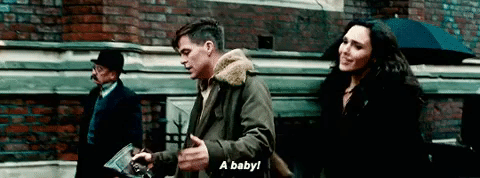
(Gif credit.)
When most people hear “strong female character,” they picture the most popular definition of the term: a stony-faced, emotionally shallow, conventionally attractive broad who punches and kicks stuff. She may occasionally shout things like, “I DON’T NEED NO MAN,” while perhaps punching a small baby.
I decided to start with my wife Diana, because she is the perfect antithesis of this trope. She isn’t stony, she’s courageous. She’s unabashed about showing her doubts, hopes, affections, and optimism. Her love interest never steals her spotlight, but she feels no need to shun romance to appear “strong.” She’s beautiful, but not sexualized or objectified.
And while most Strong Female Characters™ are ironically reduced to damsels in distress at some point in their own narratives, Diana consistently takes the lead, totally autonomous over her own story.
You can kick ass AND love babies, people. Joss Whedon, please take notes.
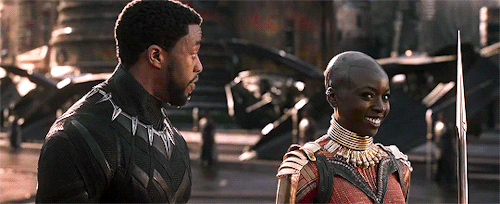
(Gif credit)
Other examples: Okoye from Black Panther, Furiosa from Mad Max: Fury Road, Rey from Star Wars, and Ser Brienne of Tarth from Game of Thrones.
2.) The Comedian
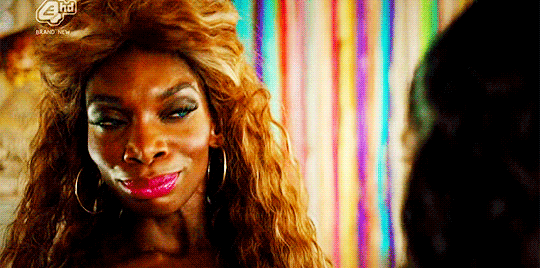
(Gif source)
If you haven’t watched Chewing Gum on Netflix, stop whatever you’re doing and watch it right now. Its relatively simple premise – a twenty-four-year-old from a fundamentalist Christian household struggles to lose her virginity – is a segway into a hilarious, genuine exploration of human sexuality, relationships, and how we forge our identities.
Brilliantly portrayed by the series’ creator, Michaela Coel, Tracy is essentially that one friend who knows exactly what you’ve been thinking and isn’t afraid to say so. She is never relegated to a single trope or stereotype. She’s stumbling, clumsily but enthusiastically, through the life experiences that shape us. Most importantly, she is allowed to be sexually curious, awkward, aggressive, insecure, and – I can’t stress this enough – hilarious. The dialogue is infinitely quotable, and endlessly relatable.
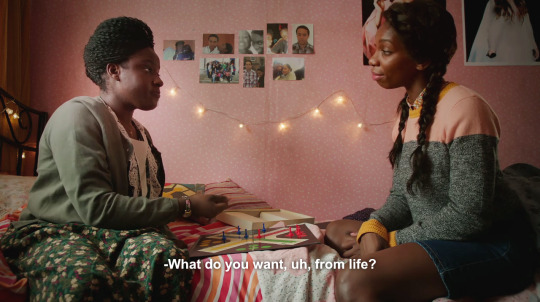
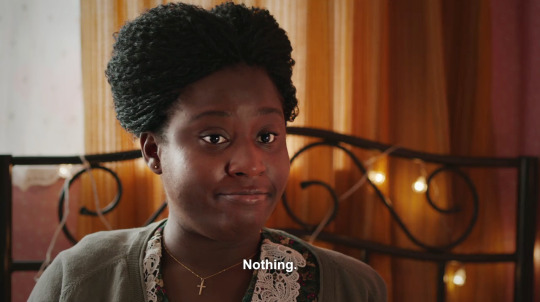

(Image source)
Watching shows like Chewing Gum makes me realize how few female characters – and even fe wer Black female characters – are portrayed as truly human. Typically, they’re allowed to be sexy, but not sexual. They’re allowed to be awkward, but only if it’s cute. They can be insecure, but only if that insecurity can easily be solved by the affirmations of a male love interest. And they’re rarely allowed to be the main source of a series’ comedy.
So remember: let your female characters be human. Let them be awkward, funny, sexual philosophers. It’s easier than you think.
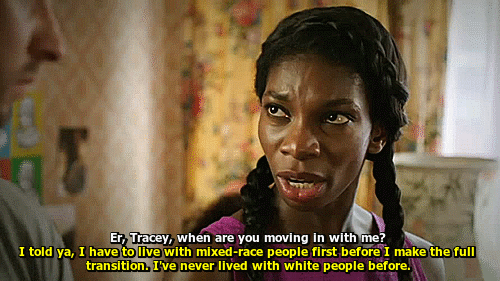
(Gif source)
Other examples: Abbi and Ilan from Broad City, Leslie from Parks and Rec, Tina from Bob’s Burgers.
3.) The Drama Queen

(Gif source)
Watching Riverdale is like hurtling along on a structurally unstable rollercoaster. It’s utterly insane, a lot of fun, and once you’re on, you can’t stop.
But amidst the explosions of batshit crazy plot points, killer cults, and the existential perplexity of finding yourself attracted to emo Jughead, there are some real gems. One of these is Cheryl Blossom, and pretty much every plot line surrounding her.
Cheryl is introduced as a fairly one-dimensional, catty mean girl, though the Regina George-esque charisma with which she’s portrayed makes her instantly likable. Initially, we expect her to be a character we’ll love to hate.
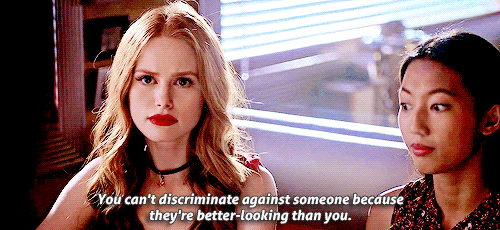
(Gif source)
And yet, within the first few episodes, I was impressed by how layered and complex her motivations were. Much of contempt towards others was misdirected rage from an upbringing of extreme emotional abuse, and grief over her dead brother -- all portrayed without a Snape-style condonation of said behavior. By the end of season one, my thoughts were generally, “Oh, crap, I don’t think I can claim to be watching this ‘ironically’ anymore,” and “MORE CHERYL.”
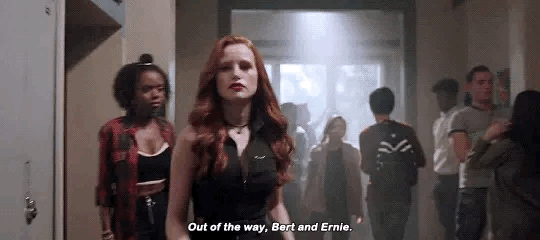
(Gif source)
Season two answered my wish, and then some. Cheryl was saved from an (impressively conscientiously portrayed) attempt at sexual assault by a pack of her female friends, and her attacker got the shit beat out of him in one of the most cathartic moments of modern television.
To the exaltation of my queer heart, she also came out as a lesbian, in a deeply moving story arc that I never would have expected from this show. Without spoiling too much, she and her new love interest kissing in front of anti-gay propaganda footage was legitimately one of the most powerful moments I have ever witnessed.

(Gif source)
Before the season was over, she viciously threatened her abusive, homophobic mother while covered in blood, shot a serial killer with a bow and arrow, and joined a gang. If that’s not gay culture, I don’t know what is.
Oh, how I wish this show was just about her.
Other examples: Alexis from Schitt’s Creek.
4.) The Lovable Bastard

(Gif source)
Ah, The Good Place. I have never experienced such a breath of comedic fresh air. A new philosophical principle each episode, examined and applied in hilarious and thought-provoking ways. A complete absence of harmful stereotypes. Incredibly lovable, three-dimensional, and ever-evolving characters.
I was considering using my queen Tahani for this list, who externally larger-than-life and internally vulnerable after emotional abuse by her parents. Also, she’s hilarious. Everyone and everything in The Good Place is hilarious. And I also thought about talking about Janet, who is the best character in anything ever, but of course:
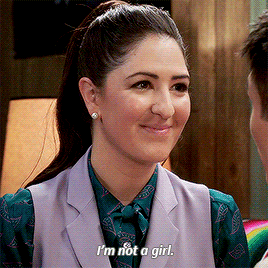
(Gif source)
Instead, I’ll be talking about bisexual icon Eleanor, who is something very few female characters get to be: the lovable bastard.

(Gif source)
Eleanor, when we first meet her, is not traditionally good in any sense of the word. She turned down a high-paying job because she was expected to be nice to people. She sold placebos to the elderly, and was great at it. She was drunken, slovenly, hedonistic, and selfish. And she’s instantly incredibly likable.
Why and how Eleanor is so enjoyable, even at her very worst, merits an essay all its own. But in a nutshell:
We empathize with her. We are introduced to “The Good Place” completely through her eyes. We are in her shoes.
The stakes are high. When we discover that her entry into the good place was a mistake, we want her to be okay.
We come to understand her, and how her terrible childhood shaped her destructive behavior.
She wants to be a better person, and with time, effort, and character development, we watch her become one.
Not only is this an amazing lesson in how to endear audiences to your character, it is also infinitely refreshing. The most famous lovable bastards are all men -- Han Solo, Dr. House, Captain Jack Sparrow, the Man With No Name, et cetera -- but women are rarely afforded the same moral complexity. If a woman in fiction has done bad things, she’s not usually a lovable bastard. She’s usually a bitch.
Eleanor isn’t just a great character. She conveys an important lesson: women are people. People with the same capacity for mistakes, growth, redemption, and love as anyone else.
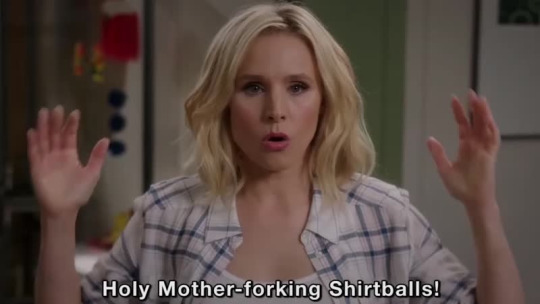
(Image source)
Other examples: Chloe from Don’t Trust the B*tch in Apartment 23
5.) The Cinderella
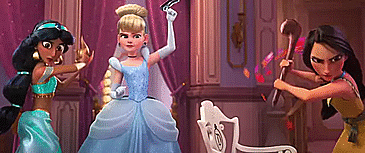
(Gif source)
Yep. I said it. Cinderella is a strong female character.
My girl not only survived in an abusive household, she persistently stayed positive. She worked each day to make the best of an impossible situation, from which she had no means of escape. That takes an insane amount of courage and tenacity.
But Caff, I hear you scream, she needed help to escape!! Well, my imaginary counterargument, so the fuck what? MOST people need help to escape their abusive situations, and there’s no shame in that. Accepting help from someone you trust is the best thing you can do in a situation such as that, and implying otherwise is horribly damaging to victims of abuse.
But she married the prince, you more feebly protest. Yes! She did! She found love and happiness and a great life in a socially influential position! And that’s an amazing message!
So in the flurry of female warriors, let’s not forget Cinderella, who tells people that their terrible circumstances won’t last forever, to stay hopeful and kind, and that accepting help from a trusted friend can lead to a happy life.
Cinderella is a bad bitch, and she deserves her happily ever after.
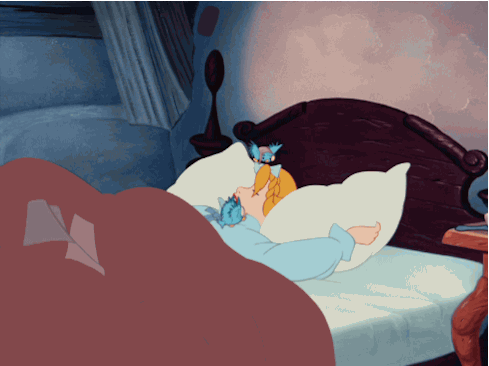
(Gif source)
Other examples: For some reason, I’m thinking of Sansa from Game of Thrones. When people try to discredit her as a strong character, they often make similar complaints. But both, quite fittingly, end up as queens.
#writing tips#writing resources#writing#caff's writing tips#female characters#strong female characters#analysis#wonder woman#okoye#chewing gum#riverdale#cheryl blossom#toni topaz#choni#the good place#eleanor#tahani#janet the good place#cinderella#sansa stark#gifs for ts#abuse mention for ts#assault mention for ts#long post for ts#gay characters#queer characters
5K notes
·
View notes
Text
Disco Elysium or: How I learned to Stop Wallowing and Love the Game
I will now review a videogame. No real spoilers. Just very vague descriptions below.
My writing this is uncharacteristic of me. I find most writing surrounding the video game industry to be repugnant. The industry (including the media surrounding that industry) relies upon the subsumption of subcultures on the fringe into the very center of the infernal machine where the dedicated and nostalgic nature of its fanbase can be exploited for capital. It’s the same process that produces Iron Man Funko Pops. Call me a jaded and pretentious pseudointellectual poseur, but in the case of Marvel the idea that this fucking billion dollar franchise with the biggest actors in the world somehow retains this guise of this ‘geek’ subculture is disturbing to me.
(If you have played the game Disco Elysium, then you can probably already see part of why I enjoy it so goddamn much.)
I don’t mean we should gatekeep. My point is the media attached to these quote-geek-unquote industries wants to milk the same cash cow (e.g. 10 AWESOME THINGS IN THE LAST OF US 2!) Coming from an academic environment of criticism, I crave at least the appearance of an honest and thorough critique of art. In my experience, you really need to go past the surface to find any reliable ‘takes’ on contemporary videogames. That being said, there’s a lot of good work being done in the form of video essays.
In any case, I play videogames relatively often. Competitive shooters, mostly. But I suffer no story in videogames. Why would I? I read the most *genius* pieces of literature in the English language. I’m too *good* for that. So when I heard all the buzz about Disco Elysium last fall, it fell on deaf ears. Detectives? Disco? Isometry? Story-heavy. Ugh. I’m interested in none of that. But about a week ago, a friend of mine bought the game. Unlike me, he is a real adult with a real job so it was just a whim on his part, I believe. I looked at the game and, with Steam’s lax refund policy in mind, I bought it. In the past week I have put approximately thirty hours into this game. This review is a way for me to explore my own thoughts surrounding the game, thoughts that I didn’t include in my steam review (See below.)

So it was devastating, sure. And this devastation was somehow positive. One thing that I would like to make clear about me talking about this game is that it is fucking useless. Disco Elysium possesses that quality that exists in all great art; it is irreducible. When I try to explain this game to my friends, I find that my words fail to describe what’s so great about the game. Let me give you the elevator review I’ve come up with. *This game has allowed me to explore the breadth of human experience*. It’s an absolutely insane thing to say about a game. The writing, the art style, the story, the world, the RPG gameplay, they all work together to create a kind of experience that I have never encountered in a piece of art before aside from those few, fleeting moments when you feel as though you truly *get* an encyclopedic novel you’re reading (and in my case I usually don’t get it.)
I will not delve too deeply into the mechanics of the game. There are probably plenty of articles and videos that describe the game already. Put simply, the game is about choices. You can choose to solve the murder however you want. You can say absolutely batshit things to people. You can say mildly bemusing things. You can speak apocalyptic prophesies, espouse communism, conservatism, Moralism. race science.. There are moments when you genuinely *feel* like you can say anything, which is quite a feat when you really only have a few dialogue options at any given moment.
As you’ve noticed, this is not a review of the videogame. Playing this game after a tough breakup was sort of earth-shattering. I mean, not only am I navigating through a strange virtual world with its own history and culture and cosmological makeup, I’m diegetically grieving over being left by my *divinely* beautiful ex while I, the player, undergo a similar process and find similar coping mechanisms. Playing this game was like knowing the funniest clown in the world, a clown so funny that you thank him when he occasionally punches you in the chest to make you *feel things*.
The plan wasn’t to make a character whose qualities reflected my own. I just wanted to play the game. I wanted to win. It just so happened that because *I* was the one playing the game, the character essentially turned into me. It doesn’t help that I, too, have had my issues with alcohol, drugs, commitment, and mental health (in no particular order). The character ended up becoming *me* in a way that I’d never experienced before. I faced ethical dilemmas. My ideology was shaken. This game achieves unbelievable mimesis.
Here’s the wild thing: this game has changed me. I feel like a thirteen-year-old white boy who just watched The Boondock Saints and got a pretty okay over-the-pants handjob at the same time. I’m thinking about my life in terms of choices. The game enforces a kind of perspective of the world that highlights its contingency and the permanence of choices. You can, of course, save your progress in the game and reload whenever, but I found myself just sort of riding out the bad choices I made unless they were game-ruiningly catastrophic. (E.g. I had a “thought” equipped that made me fail every unrepeatable *red* check during a pivotal firefight; it was a hilarious disaster. We were essentially mowed down.) I stood by most of my bad choices. After all, I made the choice using the information I had at the time.
I am not good at this game. I absolutely bungled the investigation. I was just a pawn for forces far greater than myself. Seven people died, and I know that I could’ve saved a few of those people, if not all of them. I think about it sometimes. I think about what I could have done, how I could have gone deeper to find out what’s *really* going on, how I could take control of the investigation rather than be taken control of. Maybe I’ll play the game through again, but the first playthrough is kind of magical if you know absolutely nothing about the game like I did. If not for an absolute deus ex machina at the end, I would have been taken to the madhouse. It would have been an unbelievable failure.
During that deus ex machina moment, by the way, a goddamn tear rolled down my cheek. Yeah, I’m in a rough place, personally. But I don’t *cry* over characters in art. They’re not real. But damn if that changed. I tell you it’s changed *me*. I care more for characters. I know they’re not real but they represent something that I can relate to, no matter who they are. This game has made me think about empathy more. Maybe it’s because I dumped all my points in the emotional skills. Maybe I’d be more violent if I rolled with the physical skills. Maybe I’d feel like a superstar if that’s what I chose to pursue in the game. Disco Elysium feels open-ended enough that if you sign up for the story, the aesthetic, and the investigation itself, then you can get whatever you want out of the experience. The game, again, achieves incredible mimesis.
The mimesis is so convincing in Disco Elysium that it feels as open-ended as reality, with one caveat: you *know* it's a game. You, as a player, know that the experience of Disco Elysium is a designed one, that it was created as a sort of origami structure, that there is narrative and, god help us, *meaning*. What this game-knowledge afforded me during my playthrough was the constant sensation of synchronicity. I found myself saying “I don’t know how this element will fold into the grand structure of the game, and it almost seems impossible that it should become part of the investigation narrative.” But because I know it’s a game, I am graced with the confidence of the highly religious. Everything will come together in the end.
This is not a review for a videogame. This is a confession. I am deeply flawed and I want to change that. My worldview has been shaken because of a videogame. I don’t want to be that kind of animal anymore.
I’m trying to empower myself, to become more aware that my choices do indeed matter, have always mattered. I’m trying to be more pragmatic, to consider the things I want to do in terms of their result rather than the momentary pleasure I will derive from doing them. Now *that’s* a change for me.
I’m trying to be more empathetic, more willing to imagine the perspectives of others.
I am trying to give the world around me the benefit of the doubt. It is easy for me to think of the world as a random coincidence of matter, but if you look at the world with totality in mind everything seems to take on this Spinozan glow of divinity. The human mind is a meaning-making machine, I think. If I look at the world as fundamentally devoid of meaning, then that is still meaning. It is nihil-ism. It’s still an -ism. But if I ascribe to the world a kind of glowing potential, as though meaning were to be found in every speck of matter, then I feel invited to participate in this massive dance that we’re all a part of.
I’m trying to be more adventurous, because beneath the surface of things there seems to be a vast network of relationships, causation, possibility and, god help me, *story*. Or maybe it’s not beneath the surface of things, maybe there is no Deleuzian schizophrenic depth beneath the surface, perhaps the world is a homogenous and ever-developing surface upon which I constellate meaning and, thereby, create it. I’m trying to create a story for myself that will hold a candle to my experience playing Disco Elysium. I didn’t ask for this; it was just what I needed. It was, in a word, unforgettable.
#disco elysium#criticism#game review#videogame#video games#hire me zaum#I dont want to be this kind of animal anymore#essay
29 notes
·
View notes
Text
I copied the text of this article below for anyone who is unable to read it behind the content blocker:
Summary: In the second season of Netflix’s series The OA, its creators question the relentless technological progress of our time, but the result is somewhat scattered.
The OA
Article by Sanja Grozdanic
In early 2017, soon after the release of the first season of The OA, its co-creator Brit Marling spoke at length with her friend Malcolm Gladwell about the series for Interview magazine. During the conversation, Gladwell asked Marling why she is so drawn to fantasy and speculative science fiction, both as a writer and an actor. These genres, she explained, best reflect her view of the world and the deep mythology she naturally invests in everyday moments and objects.
“I think I need to believe in that version of reality because I get very scared when I don’t,” she said. “I feel very alone when I don’t feel that.”
Social isolation, technological domination and the profound discontent of a generation are all explored by The OA, a series that positions itself against the exploitation demanded by capitalism and is strung together by a storyline dense with time travel. Understandably, it has divided audiences. It has been called “absolutely insane”, “batshit” and “brilliant” – and yet has also gained a cult following and brought into focus a desire for the construction of new narratives and mythologies.
As Marling told Gladwell, “The OA is our attempt at writing and making a new human language through movement, this mythology we’re inventing.”
The series began its first season with Prairie Johnson (Marling), a woman missing for seven years who is rescued following an ostensible suicide attempt. Prairie was once blind – now she can see. She will not reveal to her family how she gained her sight, nor tell them what happened to her. She denies she was trying to kill herself, insisting she was only trying to “go back”. To where is the central mystery of the show’s first season, tagged as Part I, slowly revealed over eight episodes.
As the first season unfurled itself, I understood The OA to be an extended metaphor for post-traumatic stress disorder. In another life, in another dimension, Prairie is held captive by the show’s central villain, Dr Hap (Jason Isaacs), a scientist obsessed with near-death experiences and the power they bestow on survivors. Prairie, I believed, constructed her captivity as a trauma response – a hyper-fantasy of good versus evil, which allowed her to regain a sense of control.
The show’s perplexing narrative structure echoed a survivor’s frenzied mental state, a reading of existential crisis that I liked. When mental illness is feminised, it is often depicted as tepid and lifeless. But The OA gave weight to Prairie’s somatic condition, depicting it not so much as a defect but as a lifeline; a way to give form to what she cannot say. “Madness as a defense against terror. Madness as a defense against grief”, as Susan Sontag described it. One cannot live in such a world, but its genesis is all too human.
Part II of The OA proved my reading entirely incorrect.
In this season, the series relocates from North Carolina to San Francisco, California. It feels a fitting evolution in many ways – from the margins to the centre of technocapitalism.
In San Francisco, Prairie awakens in the body of Nina Azarova – a Russian heiress who lives in a penthouse, dresses in Gucci and is engaged to a tech billionaire named Pierre Ruskin. She has no memory of this life of material excess, but no one from her former life – of Prairie, the blind orphan – remembers her. Concerned for her welfare, a psychologist sends Nina to a facility on Treasure Island in San Francisco Bay for a 14-day psychiatric hold.
At the same time, elsewhere in the city, private investigator Karim Washington (Kingsley Ben-Adir) is hired by an elderly Vietnamese woman searching for her missing granddaughter, Michelle. Michelle disappeared after winning thousands of dollars playing an app, which seems to alienate and consume its users, while tempting them with the possibility of vast riches.
Following Karim’s attempts to trace the app back to its creator, the series starts to question the ethics underlying the startling decadence and terminal decline of the Silicon Valley social order. Karim discusses the app with a tech worker who suggests crowd-sourcing is nothing more than a euphemism for free labour. “What, erase the boundary between work and play, hide your sweatshop in the cloud?” he asks her. “Exactly,” she replies.
Who will protect those most vulnerable, like Michelle, in this rigged game? How are we compromised when our most intimate, private desires are mined as data? In a sprawling converted factory, Karim finds young women held in a literal dream farm, an attempt by a tech billionaire to instrumentalise the social unconscious in a search for the secret to time travel. A dystopia perhaps not radically removed from our present.
But amid all these subplots, the point is scattered, lost between too many narrative arcs. The choice to be so laser-focused on Marling’s character feels like a misstep – particularly while the profound discontent of this season’s younger characters seems far more urgent and vital than Nina’s struggle. Those characters are sidelined. Instead, the series insists upon a love story that has long since lost its romance or intrigue. Karim, too, is denied sufficient screen time and character development.
It is clear The OA is attempting to tap into something deeper. A renewed interest in the exploration of multiple dimensions and realities, including the series’ Netflix stablemates Russian Doll and Stranger Things, suggests a general recognition of a profound cultural lack. Suspended over a void, we face several conflicting futures. History repeats itself endlessly – infinite parallel worlds with interchangeable players.
Pierre Ruskin could be Peter Thiel, the billionaire tech investor long dogged by rumours he wants to inject himself with the blood of young people to stave off the effects of ageing. In another, more socially minded dimension, he could have been Alexander Bogdanov – the Soviet physician, philosopher and science fiction writer who also had an interest in what blood transfusion could do, but from a communist, rather than hyper-capitalist, perspective.
The 19th century defined the idea of progress as an infinite and irreversible improvement; the Hegelian idea of cumulative progress. Indeed, the myth of progress has been the West’s ruling ideology. But for downwardly mobile millennials facing social collapse, environmental catastrophe and unprecedented species extinction, this narrative has lost its primacy, or indeed its validity.
In the final episode of Part II, detective Karim saves one of the app’s users, but in doing so only manages to seem moralising and out of touch. Though addicted to the physically invasive, impossible game that inherently negates social life, the millennial doesn’t want to be saved. Remorseless and defiant, they see no future in the present Karim offers.
With this season, Marling and her co-creator, Zal Batmanglij, show themselves to be genuinely interested in moving The OA beyond emotional landscapes to the structural conditions fomenting this discontent. As Batmanglij explained, the pair sought to make “a gangster movie without the gangsters, because it’s the idea that it’s not just killing one bad guy or two bad guys, but it’s a whole city is to blame”.
But the question remains whether a show commissioned by Netflix – a company now worth more than Microsoft founder Bill Gates and only slightly less than Amazon CEO Jeff Bezos – can ever honestly critique our present moment, shaped by the dominance of the tech giants. A successful Netflix product can be judged by its compulsive consumption; how quickly do viewers watch a season? “At Netflix, we are competing for our customers’ time, so our competitors include Snapchat, YouTube, sleep, et cetera,” said Netflix chief executive Reed Hastings. Where profit was once maximised with families and romantic comedies, in our moment of precarity it is apocalypse that is commercially seductive.
5 notes
·
View notes
Text
Meta reflections on Jesse Pinkman’s new book, Enlightenment Now, with a special focus on the Joe Rogan chapter
Warning: This was supposed to be a really quick thing about the reception of Steven Pinker's new book, in part just to rev this blog back up as an easier-going place for short, fun stuff. Accidentally it became a 4k-word world-historical meta-narrative about the changing political coordinates of contemporary intellectual life on a razor-thin evidentiary base.
I just read RS Bakker's thoughts on the new Pinker book. I thought they were very stimulating and seemed important/credible—although I didn't grok everything in my one time through on the train. They did, however, motivate me to jot down a few thoughts that have been recurring to me lately. They're not really related to Bakker's post.
I'm not going to comment on the Pinker book, first because I haven't read it; second, because I don't like playing in already overpopulated peanut galleries, it pains my frail ego; third, because, as with many things today, it seems to me the real theoretical points of interest are at a meta level. There's a time and place to use proper names, no doubt, but individuals and their particular products are often red herrings, I think. If I use the name Pinker below it's just for shorthand; this will really be about the larger class of prestigious public intellectuals of which he is only one example (as opposed to, say, the high-brow but unpaid batshit blogger class, the personal-brand-with-a-patreon class, the Youtube philosophy for dummies educator class, the Alex Jones balls-to-the-wall flight from Earth class, etc.). It turns out there are wayyy more ways to be a famous and influential intellectual than anyone could have known when they were in grad school in the 70s or 80s, or even the 90s really.
In fact, I won't even use Pinker's name, to emphasize that I'm really not out here trying to ankle-bite this great and good scientist who is much smarter and more accomplished than myself. Wherever I might want to refer to Pinker as an example, I will instead refer to Pinkman. That way you'll think of Jesse from Breaking Bad, in the form of a prestigious social scientist instead of a meth kingpin.
Highly successful and publicly influential academic intellectuals are playing a very particular kind of game. The logic of this game made sense even ten years ago, but I'm not sure it does anymore. The logic is something like this "Get really smart, make real scientific contributions, earn legitimate credentials and status, then leverage this elevated status to shape the body politic toward the Good (and also be handsomely remunerated, admired, etc. — but hey, fair enough.) I've never met Pinkman or many other famous scientists but my sense is they have given much of their life to some version of this noble vocation. This is an archetypal Liberal identity-mold, a tried and true, recognizable Calling, in a world where such things are increasingly hard to find.
Well, the past decade has thrown up some data points that really make you wonder whether the basic terms of this model still obtain. A few things lately have given me the bad feeling that someone like Pinkman may have invested most of their life in a certain kind of bargain with Liberal Society that, sadly, Liberal Society has now reneged on. I say this is a bad feeling because, if true, it's very unfortunate and I genuinely feel for them.
So what's this bargain I speak of, in a little more detail? First, for background, remember that for much of our history highly talented and creative individuals are typically punished by their groups. Reverse dominance hierarchies, etc., you can't let super talented people get too ahead of the others because then they'll dominate, or group morale suffers, or the group disintegrates, or whatever. Bad things will happen. So they'd cut you down to size at every opportunity. But liberal society was willing to offer super smart and able people a bargain: If you're really smart and able, then you can go off and cultivate your smarts but only on condition that you respect Liberal Society. It's a pretty genius solution actually: let the ablest flourish above everyone else but make them pay a cut of their gains to the cohesion of the whole. Win-win. The society got all the benefits of crazy geniuses solving problems, without them dominating or collective cohesion suffering. The geniuses not only got to enjoy their objective superiority on full blast, they also got to feel like it was all about doing good for others. And maybe it is.
It is the right to generously bestow social improvement that is one of the great joys of being a prestigious intellectual--could you imagine how exhilarating it must feel to have earned, through a life of study, the exalted role of institutionally sanctioned Society Improver at grand scale, how genuinely good it must feel to know that all of your sacrifice and hard work now empowers you to improve the knowledge and character of millions, and the political health of a whole society? Understood a little more rational-choicely, this is one of the key income streams that liberal society pays to its most prestigious geniuses, in return for their lifelong loyalty to all of the official tenets of harmonious Liberal Society. I think the data is pretty obvious in showing that no matter how genius you might be, if you go off the rails of "reasonable discourse" beyond a certain degree you quickly lose all of your standing and influence (on this model, anyway.
(Note that the newer classes of public intellectuals have figured out that if you decline the liberal institutional bargain, then going maximally off the rails can be its own direct path to extraordinary intellectual influence and economic reward. But more on that later, let's stay on track understanding the fine print of the liberal intellectual's bargain with liberal society).
Here's where things get a little shadowy because the harmony of Liberal Society is quite sensitive. It's kind of like a precious baby, and we love babies and would do anything to protect them, but this is how hypocrisy enters in automatically, because Liberal Society requires everyone to presume everyone else is an adult, and to treat everyone as such. For instance, when two groups violently disagree over certain deep moral questions, well, liberal society doesn't allow them to deal with it violently (a good thing perhaps, as Pinkman has amply documented). But what does it do instead?
The simplest way to summarize all of the things that Liberal Society does to reduce violence: It papers over the conflicts, which is maybe a brilliant solution, or maybe an insane, explosive solution that simply hasn't exploded yet — the jury is still out on that one. If Group A thinks abortion is murdering babies, and Group B thinks prohibition of abortion is enslaving women, the only way to deal with such profound and high-stakes ethical disagreement, other than civil war, is to derive some symbolic artifice(s) that will let both groups live peacefully with the other. Hmm, thinks Caesar, do we have anyone around here good at generating clever symbolic artifices? In swoops the knighted genius. The genius is delighted to take a break from self-cultivation in order to contribute to Harmony, and Caesar, as well as the common people, are happy to have someone on hand to explain why I don't have to worry if my neighbor is Evil. Win, win, win.
Thus baked into the vocation of the modern liberal intellectual is, from the get-go, a highly dissimulated condescension and hypocrisy. The liberal intellectual gets their status precisely from a superior ability (earned or inherited, doesn't matter) but they are contractually obligated to treat the normal masses as equals, when they know damn well that in fact, the normal masses are dumber, more dangerous, and in need of Harmonizing by institutions (paper). Also, remember that the genius wants to help, it's extremely rewarding to sincerely help society, but the noble sacrifice the genius admirably contributes to the social good is precisely the papering over, of whatever the normal masses need papered over for their well-being. This is how a basic minimum of dissimulation, condescension, and hypocrisy is structurally embedded in the vocation or calling of the modern liberal intellectual. We might note in passing it's also an avatar of Plato's Philosopher-King, a conceptual-political thought-rut that many progressive intellectual personae tend to inhabit in one way or another (and yes, here, Pinkman is a Progressive, despite some infamy among SJWs).
OK, so the modern liberal intellectual might be forced to pay lip service to a few small Noble Lies, but it's soooo much better than all that homicide and war in the earlier chapters of Pinkman's violence book, that it seems like a no-brainer. "There are political realities, it's not my fault, all I can do is speak the truth in a way that helps society the most. If that means I have to use my words judiciously, is that really so bad?" an elite cognitive scientist might reasonably ask. The only problem is that this entire model presumes that the speech of the prestige intellectual will remain highly weighted relative to the speech of anyone else who might take it upon themselves to explain things publicly.
What if external circumstances change in such a way that the masses start to intuit that the knighted geniuses have quietly been playing a political game all along? What if, empirically, things just so happen to play out in such a way that a critical mass of pretty average people (on the right and the left, and in their own languages and for their own reasons), quietly update their mental and behavioral models of the world in the realization that: "Eureka! I have a strong suspicion that some really serious issues have been papered over for some time now... and I'm not going to be a dupe any longer. I see what's going on, and I can play this game, too..." Well, one thing to note is that if this updating were to occur, even on a massive and rapid scale, there's no reason to believe we would know it anytime soon after it occurred. The next thing to see is that, suddenly, the entire bargain that the prestige intellectual based his whole life's labors on would suddenly be off the table.
So long as your pronouncements are weighted well by institutionalized attention monopolies, your lifelong service to science mixed slightly with Harmony-producing fluff was a reasonable and even maybe noble project. If your prestige loses its weight, then tempering your extreme intelligence with little white lies would be all for nought, because you're about to be left in the dust by new startups who specialize in unreasonably extreme truth-telling ("red pills" and many other colored pills now available) and also unreasonably extreme hypocrisy (self-help bullshit, SJWism, etc.). You'll still have your niche, but your effect on people and society will rapidly fall towards zero (along with the overwhelming majority of other people, including most smart people).
It seems to me that as a sociological phenomenon, Pinkman's recent book dramatizes a lot of what I'm modeling here. I think the world has changed a lot very recently and with many things we're like the roadrunner who's already off the cliff, but we haven't yet looked down to see the vast empty space beneath our galloping gait. In a strange way, I think dumber people have been doing more correct updating as of late, and some of the smartest people have been stubbornly failing to update lately. Dumber people have updated to not listen to a word of what the mainstream intellectual culture says, but smart people have not yet been able to update in response to this updating by dumber people (in part because smart people don't have any way of hearing about how dumber people are updating, and they're not exactly accustomed to caring about it). The inertia of media representations enforces a substantial lag between increasingly rapid techno-economic changes in the distribution of powers and our meager human mental models of where that power is.
All of this has been quite abstract, and I mentioned above that I have some data points, so I'll just end with those. I might have tricked you, accidentally, because to be honest, I've extrapolated this whole bonkers historical meta-narrative from a few very measly anecdotal observations. Well first, I kind of had in mind things like Trump and Brexit, i.e. signals of widespread mistrust of dominant institutions and respectable liberal wisdom. So those are pretty big and real data points for the kind of perspective I'm articulating here. I also have a few more specific ones, although they are very tendentious.
The first one is so silly, you're really going to laugh at me for writing this long post in part because of this ridiculously tiny and personal anecdote. You can write your own blog, I for one sense significant causal evidence in this little story. Basically, I listened to the Joe Rogan podcast with Pinkman about his new book and... Pinkman was fine, he's a brilliant and likable guy... but... something was wrong. Very wrong. Don't tell anyone because it's kind of orthogonal to my personal brand and I have to stay on point, but I've listened to many, many Joe Rogan podcasts. And I'm a professional social scientist mind you, so if anything the Pinkman podcast should be more interesting and effective on me, relative to the average episode. But it was just so... "boring" is not even the word. Flat? Anachronistic? Bloodless? Zombieish? None of these quite convey it, but together they give some sense. The point is that, as a minor young academic but a relative connoisseur of the new media, for me something really significant in the machinery of intellectual experience was failing to fire, so much so that it was quite strange. I was surprised and confused. But now I think I understand it; it's everything I've said above.
The world that Pinkman seems to think he is in, is not the world we're actually living in now. The book will be successful economically of course, but it has no affective-identity constituency, other than people who are already socio-culturally neutralized or priced-in by the current equilibrium. It's hard to see how anything will move or shake from this type of project anymore. Most intellectual figures preach to a choir, of course, so Pinkman is no better or worse for that — but some choirs move and shake and generate novel ripples on world history, while others just sit there doing nothing other than precisely what was yesterday's world history. Some books and podcasts and youtube videos make people want to leave their friends and family to join a jihad, some give you strong confidence that a reality-TV star would make a great president, some give you the extraordinary realization that all of society is controlled by a white supremacist patriarchy; all of these lead to novel, unpredictable schisms and re-aggregations, new social formations and subcultures, which in their affective vitality bubble up, viralize or mutualize or enter into arms races, and end up producing system-level outcomes such as electoral victories, migrations, communicating-contagion shooting sprees, various contagious mental pathologies, as well as genuine self- and community-improvement dynamics, unequally distributed. There's nothing better or worse about the Enlightenment Is Cool niche; it's just that it's identity-affective character seems predicated on precisely what we've recently realized is already gone, as demonstrated by the whopping piece of incontrovertible evidence that was my personal lukewarm reception of Joe Rogan's podcast with Steven Pinkman.
You can say I should not generalize from my personal affective experiences, but my personal position seems like it'd be most conducive to liking and being affected by the Pinkman podcast! I'm not talking about the content of his book whatsoever, I'm talking about the reality he takes himself to be playing in. I don't think it's here anymore. First of all, the halo effect of prestige markers is weaker than ever I think. Once upon a time his prestige would have increased the excitement of listening to him. Today, much less. Second, all of the intellectual action today is coming from unique combinations of intellectual horsepower with identity alignments. Jordan Peterson is blowing up in part because he's a smart, credentialed intellectual with a message but specifically because he gives an image of admirable life for a certain type of person. It's not that JP lovers are now changing the world in a way Pinkman lovers will not, it's that JP's identity-affective alignment is not already priced in by the status quo from which Pinker's authority derives (JP tapped emotional needs not already being supplied, through new media, not prestige; hence the socio-political splash). Hell, Joe Rogan himself, who no Serious Intellectual would even call an intellectual, is making similar waves in the intellectual ecology because his basic intelligence and character combine with a certain affectively attractive performance of life that he offers to certain types of people. I could go on.
The problem for traditional public intellectuals on the Liberal Vocation model is that the image of life they herald is radically unavailable to most people so the aspirational inroad to affective alignment is close to nil; it's actually genuinely contemptible to many people (and this is getting worse as the very real racket-nature of much academia is becoming increasingly transparent; ironically the hard-science backlash against postmodernism might have unintended consequences in this regard); and the information they're able to share with the unwashed masses tends to be freely available anyway. Or worse, listeners/readers can usually find someone rehearsing the same information who also offers an identity-performance more affectively aligned with their own temperament and social position. So vanilla prestige intellectuals don't have a monopoly on the information, they no longer even have an advantage on trustworthiness given widespread mistrust toward most institutions, and they uniquely, sorely lack one of the biggest drivers of intellectual impact in the new ecology: affective-identity alignment with moving and shaking niche audiences. (Although note that, with the global internet, "niche" can very well mean several millions of people). To make matters even worse, their cultivated knack for walking the line of polite respectable "good taste" is actually a negative on the balance sheet of their social influence.
Here's another data point. I was struck by the nearly instant appearance of so many reviews and commentaries, almost all of which were ideologically colored. I don't mean that in a bad way necessarily, I just mean so many of the usual suspects were saying things to the effect you would expect them to say. And when most of those items would appear on my radar, my eyes would just glaze over. But think about the commentary that most struck me, and by "struck" I mean this combination of intellectual horsepower plus temperamentally conditional excitement. I'm talking about the post by RS Bakker that inspired this post (by the way I really wanted to just hammer out a quick 500-word thing, but this always happens, which is why I can't let myself sit down to "write a quick 500-word thing" very often). As I said, I read it quickly on the train, and at this point I don't even really remember what it said. All I know is that it had intelligent comments about Adorno and Nietzsche and their critiques of Enlightenment modernity. It was scientifically competent as far as I could tell, and then it had some kind of batshit scientific extensions I didn't really understand but which seemed promising maybe. It was only after I read the post that I wanted to see who this guy was, and from what I could grok apparently he writes fiction but also co-authored with someone in Nature? (!).
So just reflect on this for a moment. Prestige scientist I admire writes book about philosophical/political topics I am highly interested in, he does a podcast that has no effect on me, a million reviews from prestige outlets come out and I can't feel any reason to care about any of them, and it just so happens that the one item in the intellectual ecology that affected me (e.g. motivated novel production on my part), was maybe the one fiction writer in the world who has a publication in Nature writing something on his personal blog (and I didn't even know anything about him until after I read the piece). That's so strange... or rather, it would be strange if we were living even in the 1970s or even the 1990s, but it's not at all strange today. Of course there exists in the world some scientifically sophisticated blogger able to talk deeply about Adorno and Nietzsche, of course he has a blog, and of course it would find its way onto my radar. Of course it would strike me, and of course as a young academic myself right now I am more motivated to write long blog posts than do my institutional duties. Of course, this is the new reality. The real puzzle is how and why the respectable prestige dancehall of liberalism v1.0 is still populated with a good number of really smart people, when all of the music is clearly pumping out of a variegated, thousand-room warehouse of the less compromising... liberalism flatlining at degree zero.
5 notes
·
View notes